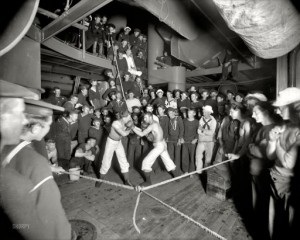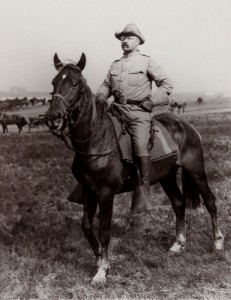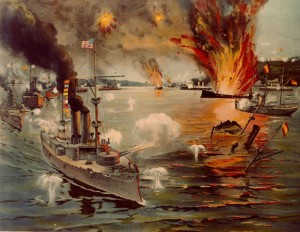I came across a humorous take on World War I the other day. “If World War I Was a Bar Fight” was first published last year, and has some debatable facts and unfortunate omissions, but it is a lot of fun.
So I naturally thought: “What other wars would work with this treatment?” Here is the Spanish-American War, if it were a bar fight…
1868

Spain is sitting at the bar with Cuba and a bunch of its other colonies. Cuba stands up and starts to leave. Spain grabs Cuba’s arm and says, in no uncertain terms: “Sit back down.”
1887
The Philippines lift their heads off the bar and look at Spain.
1890
The U.S., sitting at a table by the door, looks at Cuba, Hawaii, and the Philippines.
1892
One of Cuba’s brothers walks into the bar and sits down at U.S.’s table and starts making small talk.
The Philippines mention off-hand some new bar traditions they’d like to start. Spain glares down the bar at The Philippines and says to shut up. The Philippines shut up, and start to seethe.
1895
Cuba starts to stand up, and Spain slaps him on the back of the head. Cuba sits back down. Cuba’s brother gets up from the U.S. table and walks over to the bar and tells Spain to back off. The U.S. yells across the room that it has nothing to do with all of this.
1896
The U.S. moves his chair so that the ruckus isn’t happening behind his back. Spain tries to tell all the Europeans in the bar that it’s okay, smacking Cuba is legit. Great Britain tells Spain to shut up, and he’s on his own. The Philippines stand up at the other end of the bar. The U.S. mutters that he may have to break up this row between Spain and Cuba.
1897
William Randolph Hearst, and Joseph Pulitzer, sitting at the U.S. table, tell everyone that Spain has always been a bully and point out how Cuba is being mistreated. The Philippines walk across the room and sit down at their own table.
1898 – The year it got real…
Spain stops smacking Cuba, and says he’ll be left alone if he sits back down at the bar. Someone throws a peanut at the U.S. The U.S. stands up, and demands that Spain let Cuba sit somewhere else. Spain sends a Shirley Temple to the Philippine table. The Philippines throw it at the wall.
Hearst and Pulitzer start chanting: “Fight! Fight! Fight!”
Spain says “chill out, Cuba is cool” The U.S. steps across the room and gets in Spain’s face. Spain steps between the U.S. and Cuba. Cuba puts salt in Spain’s drink. Portugal says “Hey guys, I have nothing to do with this fight!” Spain slaps Cuba again. The U.S. punches Spain, and Cuba gives the U.S. a high-five. The U.S. invites Guam, Hawaii, and the Philippines to sit at his table. The Philippines say “thank you, we’re enjoying our own table.” The U.S. grabs the Philippines by the collar and sit them down at the U.S. table, then looks at Hawaii. Spain brushes himself off and throws a few punches at the U.S., who dodges all of them. Guam moves over to the U.S. table.
The U.S. tells Hawaii to go sit at his table, then yells “Remember The Peanut!!!” and hits Spain in the shins with a pool cue.
Spain yells over to France, “tell the U.S. to chill, I don’t want to fight any more!” France tells the U.S. to lay off. The U.S. steps back and surveys the wreckage, then punches the Philippines in the face. Spain sits back down at the bar, and the U.S. gives Cuba a fist-bump. Cuba sits down at his own table. Puerto Rico moves from the bar to the U.S. table. The U.S. tells the Philippines it will beat them to a pulp if they try to leave.
1899
The Philippines stand up at the U.S. table, the U.S. breaks a bottle over the Philippines’ head.
1901
The U.S. continues to kick the living daylights out of the Philippines, who manage to land a few blows.
1902
War ends in the Philippines, with a death toll of more than 4,200 U.S. soldiers, 20,000 Filipino soldiers, and 200,000 Filipino civilians.
I used this chronology, from the Library of Congress:
http://www.loc.gov/rr/hispanic/1898/chronology.html
(I excluded the 1902 event from the bar fight format, out of respect for the grievous cost of the Philippine Insurrection.)

This is great.
I am surprised few are drawing comparisons between Russia in the Crimea and Nazis in the Sudetenland. Maybe I’m not paying attention,
Ted
And what does Spain do when the melee is over? Trying to slink out of the bar, as if by choice, Spain is daring anyone to comment on not having payed the tab, nose slightly in the air – better not to acknowledge the defeat. Spain is limping, however, and doesn’t realize how badly he’s beaten until a leg buckles underneath him in the doorway, and collapses into a concerned pair of gentlemen who have just opened the door and seem to be looking for him, anyway – Pío Baroja and Miguel de Unamuno. The pair appear deeply embarrassed at Spain’s condition, and making quick apology for him, drag Spain out the door. These and other writers were part of “La Generación del 1898,” who were known for their critiques of the moral, political, and social conditions in Spain produced by the loss of its colonies in the Spanish-American War. Pío Baroja’s novel, The Tree of Knowledge (Spanish: El árbol de la ciencia) details what he considers the decadence of Madrid society, in particular highlighting that everyone ignored the headlines on the day of Spain’s defeat, rather continuing the day as if the Madre Patria’s golden era hadn’t just come crashing to an end… This denial that Spain was no longer the global power it had been during the age of discovery and the conquistadors (and had not been a global player for quite some time) was one of the Generation of ’98’s chief issues with Spanish society and government. As they say in Alcoholics Anonymous, before you can fix anything, you have to admit there’s a problem. This became the rallying cry for a whole generation of writers – to sober Spain up enough to be able to admit that waking up in a pool of your own blood, with little memory of how you got there is no way to keep living.
A very creative and entertaining summary of the Spanish American War.
I think if it had really been a bar fight it might not have been so bad. So many lives lost and over the sinking of the USS MAINE, no less. Admiral Hyman G. Rickover, “father of the Nuclear Navy,” would eventually lead an investigation backed by some serious science that provided the MAINE was destroyed from an internal explosion from excessive coal dust in its bunkers, rather than a mine as was alleged at the time by those who were looking for a good reason for the US to declare war on Spain. Very sad. Not unlike the Tonkin Gulf incident (or non-incident) which rapidly fueled a war lust in the US Congress leading to the Vietnam conflict. That one might have gone down a lot better as a bar fight. I think the lesson is that bar fights are begun by foolish men under the influence of something that compromises or degrades their common sense to such a degree that they think they might actually pull off the war without too many casualties, and that it will go as planned. But the beauty of a bar fight is that generally everyone who gets involved wanted to be there in the first place and knew the possibility of a bar fight was real. Few innocent bystanders are ever taken out in a bar fight, and they generally have the opportunity to exit if they really don’t want to be there. Thanks for sharing a very interesting lesson Zach.
It’s an interesting narrative, Starts a bit slow, but it picks up at the end. I like the theme of switching tables. I am curious, because i don’t think I see a reference to the Platt Amendment in here, but perhaps I missed it?
You’re right. Other than the Philipine blowback, I didn’t cover much of the aftermath.
Here is the state department’s official line on that document:
https://history.state.gov/milestones/1899-1913/platt